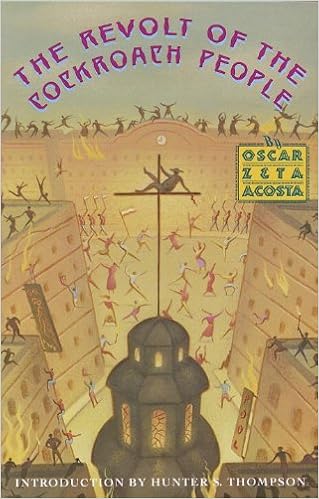I first came across this book while working in a bookstore in Pasadena, California. The Vintage editions of both of Acosta's books feature some pretty cool mural work, so the the book always seemed a little interesting to me, but I never got around to reading it. It sat in our sociology section, under Latino studies. A few years later, while in graduate school, we had to read a chapter in the book in a class on Hispanic American literature. I enjoyed it--enough that when it came time to do the paper for that class, I opted to read the whole book and do my paper on that. The paper was good enough that I was told I should do X and Y and then submit it for publication. I started into the extra research I was prompted to do, but I never did complete it (much of the reading I had already done and couldn't figure out how to incorporate) and never did revise with the intention of submitting the paper for publication. My life took me in other directions, and my interest in scholarly writing was never to the level of wanting to work and rework a piece to satisfy enough constituents that someone would publish the thing. Anyway, in thinking about reworking that paper, I must have read the book again--and I also read Acosta's first book, The Autobiography of the Brown Buffalo. I didn't like it as much, even though it seems to be his more well-known and popular work--I thought that was probably because I wasn't giving it the same level of attention in my reading of it.
This year, over a decade later, I decided to reread both. I finished rereading the first autobiography a few months ago. But again, I wasn't all that intrigued. I wondered if my interest in Acosta had wained or if most of that interest had been created by me in the interest in writing that paper. But the moment I opened the second book, I realized that it really did have to do with the book itself. The first autobiography jumps around in time and seems out of focus to me (even though I realize it's really about a man finding his purpose in life). But this second book, all about the Brown Revolution in California, seems very much to have a setting, a place, a time, and a reason, much like Acosta's alter ego. It's fun reading about the movement, enough that Acosta makes me want to read more about it, makes me want to find out in more detail what happened in the movement--and also to find out which stories he's telling are true and to what extent. (Although this second book is also billed as autobiography, the book has a warning on the copyright page that everything EXCEPT the names used is fictional, an ironic twist on the usual autobiography. But so much of the book would put Acosta in legal jeopardy that he would of course have to deny any reality. The warning also goes quite well with one of the themes in the book, which is about what constitutes truth.)
Saturday, June 14, 2008
On "The Revolt of the Cockroach People" by Oscar Zeta Acosta *****
Labels:
Books,
Five-Star Nonfiction,
Nonfiction,
Oscar Zeta Acosta
Subscribe to:
Post Comments (Atom)







No comments:
Post a Comment